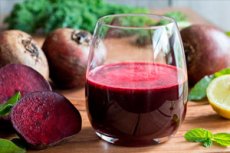New publications
Drinking beet juice daily may protect the heart after menopause
Last reviewed: 02.07.2025

All iLive content is medically reviewed or fact checked to ensure as much factual accuracy as possible.
We have strict sourcing guidelines and only link to reputable media sites, academic research institutions and, whenever possible, medically peer reviewed studies. Note that the numbers in parentheses ([1], [2], etc.) are clickable links to these studies.
If you feel that any of our content is inaccurate, out-of-date, or otherwise questionable, please select it and press Ctrl + Enter.

During and after menopause, the body produces less estrogen, which often leads to poor blood vessel function and an increased risk of cardiovascular disease.
New research from Pennsylvania State University
A recent randomized, placebo-controlled, double-blind, crossover clinical trial conducted by Penn State University suggests that daily consumption of beetroot juice may improve blood flow in blood vessels, reducing the risk of heart problems.
Nutritional properties of beets
Beets and beet juice are rich in nitrates. A study found improved blood vessel function in participants who drank beet juice daily. The results were published in the journal Frontiers in Nutrition.
The Effects of Beetroot Juice on Heart Health
The researchers recruited 54 postmenopausal women from the local community for the study, but only 24 women were included in the final analysis: 12 in early postmenopause and 12 in late postmenopause.
The participants had the following indicators:
- Resting blood pressure is less than 130/80 mmHg.
- Body mass index (BMI) from 18.5 to 35 kg/m²
- LDL cholesterol level below 160 mg/dL
- Hemoglobin A1C level below 6%
- Normal fasting blood sugar levels
All of them did not smoke or take cardiovascular medications or hormones at the time of the study.
Research methodology
While strictly following the diet, participants took two 2.3-ounce bottles of concentrated beet juice at the start of the study, then one bottle per day for a week. Each bottle contained the same amount of nitrates as three large beets. After a few weeks, participants received nitrate-free beet juice as a placebo.
Research results
The study authors used ultrasound Doppler scanning to assess the effects of beetroot juice on blood flow in the brachial artery before and after consumption, and the same was done with a placebo. The results showed that blood flow improved with daily consumption of nitrate-rich beetroot juice, but the effect disappeared within 24 hours after the last intake.
The impact of menopause on the cardiovascular system
Dr. Janey Morgan, a cardiologist and executive director of community health and education at Piedmont Healthcare in Atlanta, Georgia, who was not involved in the study, commented on the findings. She explained that the decline in estrogen levels during menopause results in a loss of estrogen's cardioprotective effects on the heart.
How Nitrates Can Support Heart Health
Delgado Spicuzza explained that consuming nitrates from plants increases the availability of nitric oxide in the body, which is responsible for dilating blood vessels to ensure blood flow and deliver oxygen to organs like the heart. After menopause, dietary nitrates can be converted to nitric oxide, helping to maintain healthy blood vessel function.
Benefits of Plant Nitrates
Dietary nitrates from plants, unlike heart medications, remain effective over time. Morgan also mentioned many other foods that are good for heart health in postmenopausal women, such as pomegranate juice, citrus fruits, dark chocolate, green leafy vegetables, berries, olive oil, garlic, fish, and green tea.
Should women start drinking more beetroot juice after menopause?
Dr. Chen noted that while the study’s premise is sound, it alone does not provide sufficient evidence to recommend beetroot consumption for postmenopausal women. Larger studies are needed to confirm the clinical results and whether the high-nitrate diet reduces cardiovascular events. For now, his recommendations remain the same: a heart-healthy diet that includes plenty of whole grains, fruits, and vegetables, low in salt, and avoidance of saturated fat, processed foods, and high amounts of sugar.
